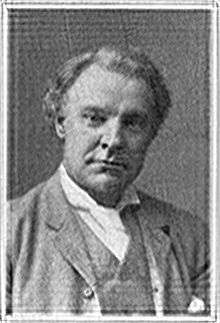David Christie Murray
David Christie Murray (13 April 1847 – 1 August 1907) was an English journalist and writer.[2]
David Christie Murray | |
|---|---|
 | |
| Born | 13 April 1847 High Street, West Bromwich, Staffordshire, England |
| Died | 1 August 1907 (aged 60) London, England |
| Resting place | Hampstead[1] |
| Nationality | English |
| Occupation |
|
Life
Murray was born in High Street, West Bromwich, Staffordshire, one of six sons and five daughters of William Murray and Mary Withers; he was educated in West Bromwich and Spon Lane.[1] At the age of twelve he entered his fathers printing business. At eighteen he was sent to London for further training in the printing business, but, following a failed attempt at romance, he instead joined the army. He became a private with the 4th Royal Irish Dragoon Guards.[3] After being bought out of the service by a great aunt, he became a journalist. Initially he wrote leaders for the Wednesbury Advertiser, then worked for the Birmingham Morning News reporting on police cases. In 1871 he married Sophie Harris, with whom he had a daughter who died young. He had four children out of wedlock.[1]
Murray covered the Russo-Turkish War during 1877–1878, then left journalism to write fiction.[4] He spent a year touring England for a series of articles published in The Mayfair Magazine.[5] Around 1879 he married his second wife, Alice, and the couple had a son, Archibald.[1] That year A life's atonement was published in Chamber's Journal, followed by Joseph's coat in 1880. The late nineteenth century English author George Gissing wrote in his diary that he had 'heard of the book as good; of course find it very poor'.[6] His 1882 By the gate of Les was serialised in Cornhill Magazine and Aunt Rachel (1886) in The English Illustrated Magazine.[4] From 1881 to 1886 he lived in Belgium and France, and from 1889 to 1896 stayed in Nice, France. Murray was well travelled, and had success as a lecturer.[1] In 1889 he performed a lecture tour in Australia, then in 1890 he assisted productions in Australia of the theatrical company of Harry St. Maur.[2] From 1884 to 1885 he lectured in Canada and the United States.[1]
He died in London after a long period of illness.[1]
Bibliography
- A life's atonement[4] (1879)
- Joseph's coat[4] (1880)
- Val Strange[4] (1881)
- Coals of fire[4] (1881)
- Hearts[4] (1882)
- By the gate of Les[4] (1882)
- Aunt Rachel[4] (1886)
- The way of the World[4] (1883)
- Old Blazer's hero[4] (1887)
- A novelist's notebook[1] (1887)
- A bit of human nature[7] (1889)
- Cynic fortune[7] (1889)
- A dangerous catspaw[4] (1889) with Henry Herman
- First person singular[7] (1889)
- Model father[7] (1889)
- One traveller returns[7] (1889) with Henry Herman
- Rainbow gold[7] (1889)
- Schwartz[7] (1889)
- The weaker vessel[7] (1889)
- Wild Darrie[4] (1889) with Henry Herman
- The Bishop's Bible[7] (1890) with Henry Herman
- Paul Jones's alias[7] (1890) with Henry Herman
- He fell among thieves (1891), 2 volumes
- Only a shadow (1891)
- Bob Martin's little girl[2] (1892)
- A wasted crime[7] (1893)
- Time's revenge[8] (1893)
- In direst peril[8] (1894)
- The making of a novelist, an experiment in autobiography[1] (1894)
- The martyred fool[2] (1895)
- The investigations of John Pym[7] (1895)
- Mount Despair and other stories[2] (1895)
- A rising star[7] (1895)
- A Capful o' Nails (1896)
- My contemporaries in fiction[8] (1897)
- A rogue's conscience[2] (1897)
- The Cockney Columbus[2] (1898)
- A race for millions[8] (1898)
- Tales in prose and verse[8] (1898)
- Recollections[2] (1908)
References
- Lee, Elizabeth (1912). . In Lee, Sidney (ed.). Dictionary of National Biography (2nd supplement). 2. London: Smith, Elder & Co. p. 666.
- Arnold, John; Woodhouse, John A.; Batten, Hay (2008), The Bibliography of Australian Literature: K-O to 2000, 3, University of Queensland Press, p. 499, ISBN 0702235989.
- Adcock, A. St. John (September 1908), The Bookman, 34, London: Hodder and Stoughton, p. 499.
- Moon, George Washington (2005), Men and Women of the Time, Part Two, Kessinger Publishing, p. 654.
- Sutherland, John (1990), The Stanford Companion to Victorian Fiction, Stanford University Press, p. 451, ISBN 0804718423.
- Coustillas, Pierre ed. London and the Life of Literature in Late Victorian England: the Diary of George Gissing, Novelist. Brighton: Harvester Press, 1978, p.266.
- De Puy, William Harrison, ed. (1896), The University of Literature, 15, J.S. Barcus, p. 654.
- De Puy, Daniel Coit Gilman; Peck, Harry Thurston; Colby, Frank Moore, eds. (1903), The New International Encyclopædia, 12, Dodd, Mead and Company, p. 740.
External links
- Works by David Christie Murray at Project Gutenberg
- Works by or about David Christie Murray at Internet Archive
- Works by David Christie Murray at LibriVox (public domain audiobooks)

- Elizabeth Lee, rev. Sayoni Basu. "Murray, David Christie (1847–1907)". Oxford Dictionary of National Biography (online ed.). Oxford University Press. doi:10.1093/ref:odnb/35157. (Subscription or UK public library membership required.)